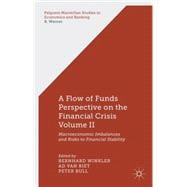Flow-of-funds accounts are a component of the national accounts system reporting the financial transactions and balance sheets of the economy, classified by sectors and financial instruments. The biggest financial crisis in a lifetime has shown how important it is to have a deep knowledge of the financial balance sheets of the main sectors of the economy and the financial flows that take place between them. This type of information is essential for a proper understanding of the transmission of monetary and financial shocks through the economy and to identify macroeconomic imbalances that could undermine financial stability.
This publication takes a flow-of-funds perspective of the financial crisis. The book illustrates the broad range of interlinkages between the financial side and the real side of the economy and highlights the role of balance sheet variables and sectoral balance sheet positions in the evolution of the financial crisis, covering the United States, the Eurozone, the United Kingdom, Japan and Slovenia. The authors also reflect on the use of financial data in the context of diagnosing and addressing excessive macroeconomic imbalances in Europe and on the use of financial accounts to underpin the analysis of systemic risks in the financial system. In this respect, the flow of funds offers a framework for looking at the right kind of questions when policy-makers consider how to prevent, manage and resolve financial crises.
This publication takes a flow-of-funds perspective of the financial crisis. The book illustrates the broad range of interlinkages between the financial side and the real side of the economy and highlights the role of balance sheet variables and sectoral balance sheet positions in the evolution of the financial crisis, covering the United States, the Eurozone, the United Kingdom, Japan and Slovenia. The authors also reflect on the use of financial data in the context of diagnosing and addressing excessive macroeconomic imbalances in Europe and on the use of financial accounts to underpin the analysis of systemic risks in the financial system. In this respect, the flow of funds offers a framework for looking at the right kind of questions when policy-makers consider how to prevent, manage and resolve financial crises.








